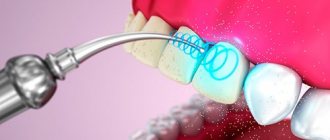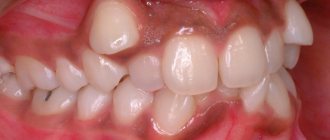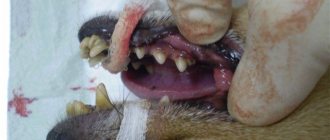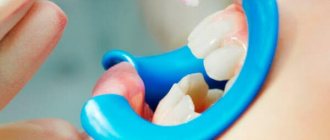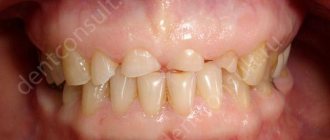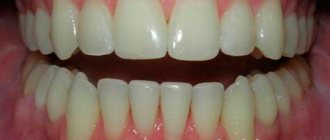The main function of teeth is to grind food, therefore one of their most important properties is their increased strength. If the teeth suddenly begin to crumble, then this is a clear sign of a serious pathology. There can be many reasons for tooth decay, from trauma or caries to hormonal imbalance. Depending on the degree of damage, the missing part of the tooth can be built up with filling material or covered with a veneer. Note that when such a problem occurs, it is important not only to eliminate the visible defect, but also to strengthen the enamel.
Teeth crumble - description and symptoms of bone destruction in adults and children
An important feature of dental tissue is that, unlike most other tissues, it is not subject to regeneration. In some cases, the enamel becomes so fragile that it simply begins to crumble. With further development of the problem, the same thing can happen to dentin. And in the future, the tissue will not be able to recover without outside help. This material will tell you about the reasons for the development of tooth enamel hypoplasia in children.
Further symptoms depend directly on the cause of the pathology - and it can help diagnose what exactly caused the fragility of the dental tissue.
If whole pieces, even minimal ones, begin to break off, this is a sign that you need to promptly consult a dentist.
Why tooth enamel is destroyed: dental and other reasons
- Dental pathologies.
- Ill-conducted treatment. Often it is an incorrectly installed seal or another mistake made by an unqualified specialist that becomes the cause of the problem.
- Malocclusion.
- Bruxism.
- Incorrectly selected toothbrush, toothpaste, floss. A paste with a high abrasiveness negatively affects the condition of the enamel.
- Improper whitening done at home. Ill-chosen whitening products can cause irreparable damage to the enamel.
- Damage to tooth enamel due to excessive and frequent brushing.
Teeth in children and adults also decay for other reasons that are associated with diseases of other organs and systems in the body:
- Gastritis.
- Hypertension.
- Problems related to the endocrine system.
- Osteoporosis. Calcium deficiency negatively affects all bone tissue.
- Metabolic disease.
To avoid these problems, it is necessary to undergo regular medical examinations. In addition to the reasons listed above, dentists identify others that briefly explain why teeth decay:
- Lifestyle.
- Bad habits.
- Poor nutrition.
- Vitamin deficiency.
- Eating too soft food.
- Heredity.
- Shape of teeth and features of their location.
- Age.
- Drinking untreated water.
- Pregnancy period.
Why dental bone tissue is destroyed in pregnant women - it is important to understand that most of the microelements and minerals entering a woman’s body go directly to the fetus, which can affect the condition of the expectant mother’s teeth. And if there are too few vitamins entering the body, the woman’s body “takes” them from bone tissue.
Reasons why a tooth may crumble
There can be a lot of reasons for this, let’s consider the main ones:
- Mechanical damage to teeth. If a person is used to chewing something hard, for example, pencils (more relevant to children, but often true for adults), then his enamel is destroyed, and microbes enter the oral cavity.
- A number of chronic diseases. This includes, for example, diabetes mellitus, problems with the functioning of the thyroid gland, osteoporosis, rheumatism, etc.
- Hormonal abnormalities. This problem usually affects pregnant women, teenagers, and older people. Due to changes in hormonal levels, the acidity of saliva increases, which corrodes the enamel.
- Temperature changes. Enamel can be damaged if it comes into contact with both cold and hot for a short period of time. A simple example is when people drink hot coffee with cold ice cream.
- Improper oral hygiene. If you don't take good care of your teeth, they will also be prone to decay.
- Poor nutrition. If you eat an unbalanced diet, there may be problems with the functioning of the intestines, problems with white spots may arise, and this in turn has a negative effect on the teeth.
- Lack of vitamin D. This vitamin is very important for the production of calcium, and without calcium, there can be no talk of any dental strength.
- Caries. Tooth decay can begin not only from advanced enamel caries, but also in situations where this caries was incorrectly cured. For example, if under the filling there are still untreated remains of caries, as a result of which the crown after some time begins to actively crumble.
These are just a number of possible causes of tooth decay. Also, this problem can arise due to malocclusion, hereditary predisposition, and even the active consumption of unfiltered tap water.
Separately, it is worth considering the situation that arises in children. Dairy products can crumble for the following reasons:
- Excessively long use of a pacifier, which negatively affects the shape of the front teeth, and this, as a result, leads to crumbling.
- The composition of breast milk is not good enough for the baby, for example, if there is too much fluoride or calcium.
- The use of a number of medications by the mother during pregnancy, for example, antibiotics, as well as the development of severe toxicosis during pregnancy.
Features of the development of pathology in children and the elderly
If a child’s teeth are crumbling, the causes of the problem should be sought in the formation of bad habits. These include prolonged sucking of nipples, fingers, biting nails, pencils and other objects. By the way, it is in childhood that this often becomes a prerequisite for the formation of malocclusion. Lack of attention and control over this problem on the part of adults can lead to difficulties with permanent occlusion, disruption of the functionality of the teeth and the aesthetics of the smile.
Milk teeth often crumble as a result of the baby’s mother taking antibiotics and potent drugs during pregnancy and breastfeeding.
The love of sweets, coupled with the structural features of children's teeth and the composition of saliva, which lacks the enzymes necessary to normalize the balance of oral microflora, is also one of the most common causes of the destruction of milk units and their crumbling.
“I always focus the attention of parents on caring for the baby’s oral cavity, because the presence of pathogenic microflora is often the trigger that ultimately causes babies to suffer from crumbling enamel and destruction of the primary occlusion. It is necessary to brush your teeth from the very first appearance - in infancy, I recommend using a silicone fingertip for this. After that, brushes with soft bristles and toothpaste without fluoride, here the procedures can and should be trusted to an older child. This allows him to be introduced to the principles of hygiene, but don’t forget to check the result,” comments pediatric dentist-therapist, dental hygienist O.A. Menchikova.
Important! Teeth crumble during pregnancy due to disruption of the woman’s endocrine status and changes in hormonal levels. Changes in the acidity of saliva and the mineral composition of enamel may also be to blame. The reason why teeth crumble after childbirth mainly lies in a decrease in the level of calcium in the body, especially if the mother was forced to eat poorly, followed a strict diet and breastfed the child for a long time. It is extremely undesirable to allow this both during pregnancy and during breastfeeding - this state of affairs can also affect the teeth of the unborn baby.
As for older people, this phenomenon may be associated, along with other prerequisites for the occurrence of the disease, and with age-related changes - slower metabolism, poor absorption of useful minerals.
Treatment methods: how to restore teeth
Since there are many causes of the problem, there may be many approaches to treatment. You should always start from what caused the fragility in the first place and treat the root cause. But there are a number of exceptions, several general measures that will help cope with the problem in the vast majority of cases. These include:
- installation of veneers/artificial crowns. This method is used exclusively as a last resort treatment when the condition of the crown is so deplorable that it is impossible to restore it in any other way;
Keep in mind that installing veneers involves preliminary grinding of your own tooth.
- mineralization. It is an application to damaged teeth, thanks to which the enamel will be enriched with calcium and fluoride. Mineralization is carried out under the strict supervision of the dentist, depending on the patient’s situation;
- the use of specialized toothpastes that contain fluoride in large quantities, as well as coating the columns with a special fluoride varnish;
- filling. This method is used primarily in cases of caries or tooth injury.
How to prevent tooth decay?
To choose treatment tactics, the dentist conducts an examination and prescribes tests. Small defects are identified using vital staining: if there is a chip or erosion, dye accumulates in them.
At the first signs of enamel destruction, the doctor carries out:
- Treatment of inflammation of the oral cavity . Eliminates inflammation to restore acid-base balance. In an alkaline environment, bacteria destroy the enamel layer more slowly.
- Remotherapy . Makes applications with a solution containing microelements that strengthen the enamel from the inside.
- Fluoridation . Coats the enamel with fluoride varnish to slow down the leaching of calcium. The procedure is contraindicated for fluorosis.
- Cleaning the carious cavity . To save the tooth, it removes destroyed tissue and bacteria from the crown.
If teeth are crumbling due to chronic diseases of internal organs, consultation with specialists is required. The dentist will recommend being examined by a therapist, who will refer you to the right doctor.
Complications
The fragility of dental tissue is inherently a complication of some other problem or pathology; if the development of this condition is not prevented, this can lead to the fact that the tooth will continue to crumble, deforming and decreasing in size, becoming less and less pleasant from an aesthetic point of view. Find out what to do if your gums hurt after tooth extraction here.
If you continue to fail to cope with the situation that has arisen, then you may even lose a tooth or several teeth.
In addition, complications can also arise due to the development of the disease that initially provoked fragility, so that in some situations a person’s health can seriously deteriorate. This link will tell you how to recognize and treat hidden caries.
Treatment during pregnancy
Most often, this problem occurs in pregnant women. This occurs due to hormonal imbalance during the restructuring of the body and a lack of necessary substances - fluorine or calcium.
First of all, in addition to the dentist, you need to consult an observing gynecologist so that he can help determine the cause. After this, simple fluoridation or enamel restoration using composite materials may be prescribed.
To strengthen your teeth during pregnancy, you must first balance your diet . It should include foods rich in calcium (milk, hard cheese, cottage cheese) and other useful and necessary elements (nuts, fresh fruits and vegetables, fish, etc.).
Additionally, you should determine with your doctor a suitable mineral-vitamin complex . It should be borne in mind that excess calcium should be avoided.
Prevention: how to strengthen enamel
It is impossible to foresee all possible prerequisites for a person’s teeth to crumble, but there are several tips that will reduce the likelihood of such a problem occurring:
- Careful oral hygiene. Regular care will reduce the likelihood of developing caries, improve the condition of the enamel and, as a result, make it much stronger.
- Correct nutrition. A person’s diet should contain enough different foods that contain ingredients that have a positive effect on the condition of enamel. For example, fish, liver, walnuts, fresh vegetables and fruits (in moderation), and dairy products contain large amounts of fluoride and calcium, which is why they are so important for oral health. But semi-finished products and a number of other products can, on the contrary, provoke a deterioration in the condition of teeth. You can also take vitamin complexes high in vitamin D, fluoride and calcium.
- Careful handling. Although accidental injuries can sometimes be unavoidable, you should not deliberately provoke physical damage to your teeth. For example, you shouldn’t open bottles with them, you shouldn’t crack particularly hard nuts with them, and so on. You should also try to minimize bruxitis. If this is not just a bad habit, then coping with the problem can be quite difficult, and you may need the help of a neurologist.
- General health maintenance. If the body has untreated diseases, if the stomach or intestines do not work well enough, then this cannot have a good effect on the condition of the tooth enamel. Therefore, if you want to prevent your body from starting a chain reaction, watch not only your oral cavity, but also your entire body.
Why does a tooth hurt after caries removal, when biting, find out here.
Treatment in adults
With permanent teeth in adult patients, the problem becomes more serious, since they will no longer be replaced like milk teeth. Therefore, many more techniques can be used.
- For the treatment of adults, universal fluoridation and remineralization . Which one is indicated in each case must be determined by the doctor.
- Also, restoration of the surface layer in many areas can be carried out using composite light-curing materials . In this case, it is necessary to select a shade of the material that will match the natural color.
- Enamel implantation is an additional technique that is used for people who already have a permanently formed bite.
It is carried out at the molecular level, significantly strengthening tissues and making them denser. - In case of multiple damage to the surface layer, chips and cracks, it is possible to restore the appearance and functionality of the teeth by installing veneers or lumineers , both of their varieties.
However, this alone will not solve the main problem - the technique corrects the consequences. And veneers and lumineers are installed only on the “smile zone” (front teeth and premolars), while wisdom and chewing teeth are not affected.
Home techniques
It is imperative to radically reconsider the approach to oral hygiene. You will need to replace the brush with another soft one.
In addition, one of the best and most affordable ways to strengthen teeth is the use of therapeutic and prophylactic toothpastes. In this case, it is necessary to comply with the requirements for use and terms specified in the instructions.
Let's find out what to do if a wisdom tooth comes out and it hurts.
This article describes the nuances of using Lincomycin in dentistry.
Here: https://zubovv.ru/lechenie/zubyi/kapli-podrobnaya-instruktsiya-po-primeneniyu.html - instructions for using dental drops.
What to do?
As soon as you notice that your tooth has crumbled, make an appointment with the dentist immediately. If you managed to collect the broken pieces, you need to take them to the dentist and show them.
If pain occurs, it is recommended to leave the damaged area alone (chew on the other side and do not touch it with your tongue) and take an analgesic (Ketanov, Nimesulide, Nurofen, etc.).
In case of severe damage, it is advisable to exclude very hot and very cold foods and drinks, which can provoke a painful reaction when the neurovascular tissue is exposed.
Why do teeth crumble?
Main reasons:
- mechanical damage (consequences of opening bottles and cans with the mouth, biting nut shells, the habit of biting nails, pencils, pens, etc.);
- deficiency of vitamins and minerals (lack of vitamins D and E, as well as calcium, weakens the enamel; this may be a consequence of poor nutrition or chronic diseases that cause calcium deficiency);
- improper dental treatment (incompletely cured teeth become fragile);
- bruxism (involuntary grinding of teeth at night);
- hormonal changes (if the endocrine system is disrupted, pregnancy and menopause, the protective functions of the enamel are disrupted);
- genetic predisposition (if the parents had similar problems, most likely they will appear in their children).
Residents of the north are especially susceptible to tooth decay. The number of sunny days in the northern regions is small, and without the sun's heat, people do not produce enough vitamin D and do not absorb calcium.
Products good for teeth
We have been told all the time since childhood that sweets in large quantities are harmful not only to the figure, but also to the condition of the enamel. Then a reasonable question arises: “What foods are good for teeth?” Below is a list of them:
- Water. It turns out that this liquid is a source of fluoride entering the body. Drinking water cleanses teeth by washing away food debris and plaque.
- Vegetables and fruits are not only a source of vitamins and minerals, but also the process of chewing them strengthens the gums and improves blood circulation in the oral cavity.
- Nuts and seeds contain fatty acids, phosphorus and calcium essential for dental health.
- Citrus fruits are rich in vitamin C, which strengthens gums.
- Seaweeds, such as seaweed. They contain iodine, which is necessary for the normal functioning of the thyroid gland. The condition of the whole organism depends on its work.
- Chicory can easily replace harmful coffee.
- Herbal tea is not only a source of beneficial substances, but also prevents and reduces inflammatory processes in the oral cavity.
By adding as many teeth-healthy foods as possible to your diet, you can rest assured about the beauty of your smile.
Treatment
Is your wisdom tooth or any other tooth crumbling? Then we go to the doctor. He may suggest the following measures:
- Mineralization. Applications are made to the damaged areas to saturate the tooth tissue with fluoride and calcium. The duration of treatment is determined taking into account the severity of the pathology.
- Coating the enamel with a special varnish. It increases strength due to the formation of a protective film on top.
- Extensive damage can be repaired with filling.
- Artificial crowns and veneers can be used when a tooth is 80% damaged.
In each case, the dentist chooses an individual treatment program.
Who is at risk of “earning” caries?
Those who ignore hygiene
Right:
- brush your teeth 2 times a day
- rinse your mouth after every meal
- Have a professional cleaning at the dentist at least once every six months.
Who doesn't know these basic rules? And who does them? And the number of bacteria is growing by leaps and bounds. As well as the number of damaged teeth.
Those who eat sour foods
Consuming huge amounts of sugar, preservatives, processed foods, fast food, and experiencing a constant deficiency of calcium, magnesium, and phosphorus is not the best way to take care of your dental health. Only a balanced diet rich in fresh vegetables, fruits, healthy fats and proteins helps prevent the appearance of new fillings.
Those who suffer from diseases of the digestive system
If you suffer from heartburn and constantly feel a sour taste in your mouth, visit a gastroenterologist. These may be signs of reflux - the reflux of acidic stomach contents into the esophagus and oral cavity (GERD). Under the influence of acid, tooth enamel is destroyed much faster.
Those who are in a special period of life
Adolescence, pregnancy, breastfeeding, menopause - all this is accompanied by hormonal changes in the body, affecting the density of tooth enamel and the ability to resist its destruction. During special periods, it is worth taking care of your teeth more carefully.
Those who suffer from diseases of the endocrine system
Hormonal disorders due to diseases of the thyroid gland, adrenal glands, and diabetes mellitus weaken the immune system, which leads to increased proliferation of bacteria and destruction of enamel.
Those taking medications
Some of them, for example, antidepressants, diuretics, antiallergic and sedatives, and drugs for high blood pressure cause dry mouth. And a decrease in saliva production has a destructive effect on teeth.
If the problem arose after childbirth
For the most part, after childbirth and during lactation, the same measures are relevant as during pregnancy.
However, in this case, completely different vitamin complexes may be prescribed. The same recommendations apply to nutrition and oral hygiene.
Additionally, you should undergo a professional teeth cleaning procedure and remove any deposits from their surface. This will prevent the development of bacteria, which will significantly reduce the destructive effect on teeth.
Why do teeth deteriorate?
Reason #1 - bacteria
They are tightly attached to the surface of the tooth, accumulate, form dental plaque and secrete enzymes. As a result, organic acids are formed - pyruvic, lactic, butyric, etc. Under the dental plaque, the enamel becomes softer, and then a defect forms on it. Moreover, the superficial layers of enamel are damaged less than the deep ones. At first glance it looks like minor damage. In fact, half of the tooth is already missing inside.
Reason #2 - pH
The more acidic the environment in the mouth, the more comfortable it is for bacteria. An acidic environment is the result of eating habits. Do you like sweets, baked goods, soda? Can't imagine yourself without smoked sausage? Are vegetables and herbs rare “guests” on your table? This is fraught with chronic acidosis - “acidification” of the body. And this is a direct path to caries. As well as chronic fatigue, osteoporosis and other “diseases of civilization.”
Teeth crumble in children: causes and solutions
- Abnormal intrauterine development . This is due to the fact that the fetus did not receive in sufficient quantities the elements necessary for the formation of teeth. This could be caused by the fact that the pregnant woman ate little food containing these elements, severe toxicosis in early pregnancy did not allow food to be absorbed, or due to compression of the umbilical cord, nutrients were poorly delivered to the fetus.
- Heredity . The poor quality of the parents’ teeth formed the basis for the formation of the child’s oral cavity and was already evident on the baby incisors, which began to crumble.
- Infant malnutrition . Breastfeeding best provides the baby with the necessary nutrients, but sometimes it is necessary to feed the baby with artificial baby food. Such feeding, especially at night, since it contains sugar, contributes to the formation of caries. After a year, such feeding should be abandoned.
- Lack of hygiene . Parents often lick the pacifier before giving it to the baby, or feed the baby with the same spoon that they used to feed themselves. As a result, bacteria from the parents' mouths enter the child's mouth, which can cause tooth decay and other dental diseases. The child should only have separate dishes and cutlery.
- Improper dental care . From early childhood, a child should be taught to brush his teeth thoroughly and rinse his mouth after eating. Milk ones are destroyed, just like permanent ones, and they should be preserved until the natural moment of their loss.
- Poor nutrition . A grown-up baby should receive with food all the useful substances for normal development, including vitamins and minerals that ensure the normal condition of the teeth. Consult your pediatrician on these issues, who will help you balance your child’s daily diet or prescribe the necessary vitamins and minerals.


